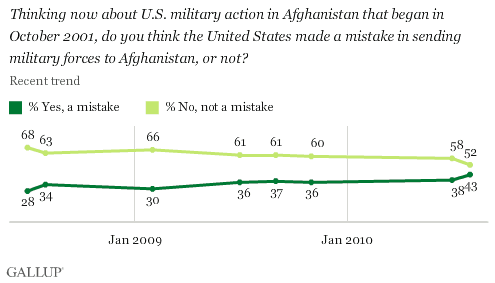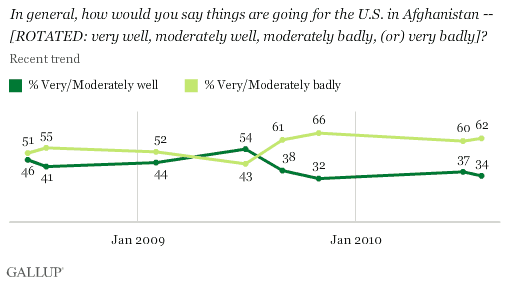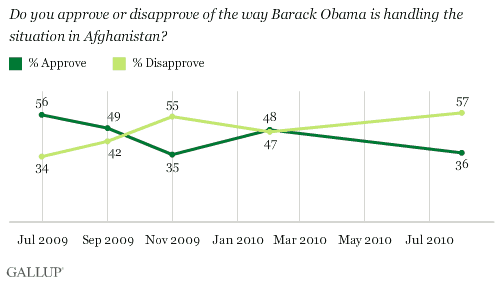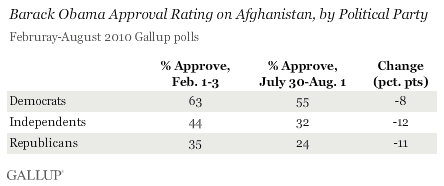PRINCETON, N.J. -- After the Internet publication of tens of thousands of leaked classified documents on the war in Afghanistan, 43% of Americans now say the United States made a mistake in sending troops there, up slightly from just before the release (38%). While Americans are still more likely to support than oppose the war, the percentage who say it was a mistake to get involved is at a new high.

The publication of the documents on the website WikiLeaks revealed the ongoing struggles the U.S. military has faced in Afghanistan trying to weaken terrorist elements in the region. But the release of these documents alone does not seem to have changed Americans' assessments of U.S. progress in the war, which were already pessimistic in a Gallup poll conducted early last month. In fact, Americans' views of U.S. progress have been decidedly negative since late last summer.

One reason Americans' views on U.S. progress may have not changed in recent weeks is because the story of the leaked documents has not captured the public's attention to a large degree. Fifty-three percent of Americans claim to be following news about the leaked documents "very" (16%) or "somewhat closely" (37%), a below-average level of national attention for news events Gallup has tested over the past two decades.
Americans generally agree the leaked documents should not have been published on the Internet, with 66% saying it was wrong for the website WikiLeaks to have done so; 25% believe the website was right. This general assessment holds among those paying high as well as low levels of attention to the story.
Obama Approval on Afghanistan Falls
The July 27-Aug. 1 USA Today/Gallup poll also finds a sharp decline in President Obama's approval rating for handling the war in Afghanistan, to 36%, down from 48% in February. Given the roughly six-month span between measures, it is not clear how much of a role the leaked documents played as opposed to more general dissatisfaction with the president's policies or management of the war.
The current reading is one percentage point higher than the president's lowest Afghanistan approval rating to date, 35%, from last November when Obama was in the process of finalizing his new policy toward the conflict.

The decline in Obama's Afghanistan approval rating since February is evident among all party groups, though slightly greater among Republicans and independents than Democrats.

Obama's current rating for handling Afghanistan is below his overall job approval rating, which was 41% in the July 27-Aug. 1 poll and 45% in the latest Gallup Daily tracking weekly average.
Implications
The 43% of Americans calling the decision to send U.S. military forces into Afghanistan a mistake marks the high point in the nearly nine-year war, although a slight majority continue to support the decision. Public support persists even though for most of the last several years Americans have generally thought the war has been going badly for the United States, and many more currently disapprove than approve of President Obama's handling of the situation.
Thus, the leaking of the documents may not be providing new information to the general public about the progress of the war. And given Americans' subdued attention to the story, it's also not clear that Americans are highly familiar with what information those documents reveal.
But the documents do remind Americans of the challenges the United States is facing in Afghanistan, and they may have caused an increasing number to question whether the efforts there are worth it. Last week, Congress approved President Obama's request for continued funding of the war, though by a narrower margin than last year.
Results for this USA Today/Gallup poll are based on telephone interviews conducted July 27-Aug. 1, 2010, with a random sample of 1,208 adults, aged 18 and older, living in the continental U.S., selected using random-digit-dial sampling.
For results based on the total sample of national adults, one can say with 95% confidence that the maximum margin of sampling error is ±3 percentage points.
Interviews are conducted with respondents on landline telephones (for respondents with a landline telephone) and cellular phones (for respondents who are cell phone-only). The sample included a minimum quota of 180 cell phone-only respondents and 1,020 landline respondents, with additional minimum quotas among landline respondents for gender within region. Landline respondents are chosen at random within each household on the basis of which member had the most recent birthday.
Samples are weighted by gender, age, race, education, region, and phone lines. Demographic weighting targets are based on the March 2009 Current Population Survey figures for the aged 18 and older non-institutionalized population living in continental U.S. telephone households. All reported margins of sampling error include the computed design effects for weighting and sample design.
In addition to sampling error, question wording and practical difficulties in conducting surveys can introduce error or bias into the findings of public opinion polls.
View methodology, full question results, and trend data.
For more details on Gallup's polling methodology, visit www.gallup.com.
